#spittlebugs
Explore tagged Tumblr posts
Text
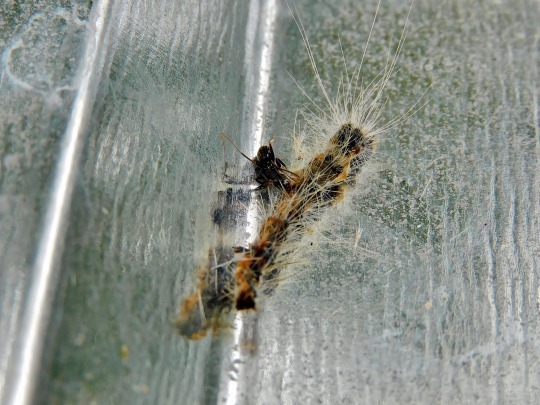

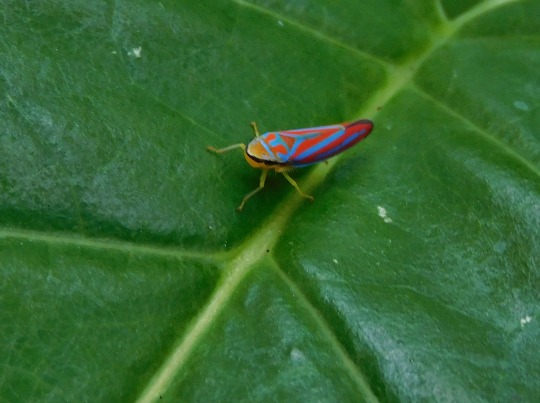
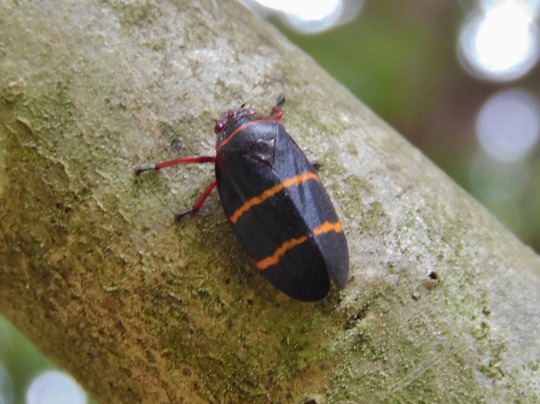

A few Insecty/Buggy pics from the day...
A Black Carpenter Ant (probably: Camponotus pennsylvanicus) dragging off a long dead Fall Webworm (Hyphantria cunea).
Likely a Banded Tussock Moth caterpillar (Halysidota tessellaris).
Candy-Striped Leafhopper (Graphocephala coccinea).
And 2- Two-Lined Spittlebugs (Prosapia bicincta).
#nature#my photography#insects#caterpillars#tussock moth#nature photography#spittlebugs#leafhopper#backyard nature#wildlife photography#bugs
47 notes
·
View notes
Text
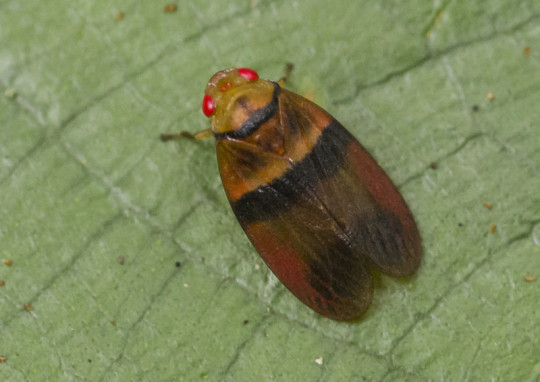
A spittlebug (Paraliterna malayana) in Malaysia
by David
#spittlebugs#froghoppers#paraliterna malayana#paraliterna#cercopidae#hemiptera#insecta#arthropoda#wildlife: malaysia#wildlife: asia
61 notes
·
View notes
Photo

When I was looking for caterpillars with the UV light the spittlebug foam lit up like Christmas tree lights. Lots of bugs came to investigate including this moth. Actually spittlebugs are also called froghoppers, a better name if you ask me.
21 notes
·
View notes
Text

Me and my friends :)
@xboy2213 - fox @flam-central - spittle bug @mayham2641 - racoon
Drew it for fun :)
5 notes
·
View notes
Text
*bleeds on you to discourage predation*
#It is 1am have a biology shitpost about autohaemorrhaging#Horned lizards#Oil beetles#Leaf beetles#Ladybugs#Spittlebugs#Sawflies#Tiger moths#Katydids#Bushhoppers#Armored ground crickets#Stoneflies#West Indian Wood Snake#European grass snake#Long nosed snake#Eastern hog nose snake#Plain-bellied water snake#Snakes mostly do it from their mouth as a playing dead assist#Bugs do it from their joints and it usually contains toxic or foul tasting compounds#Horned lizards shoot it from their eyes because why the fuck not I guess
2 notes
·
View notes
Text
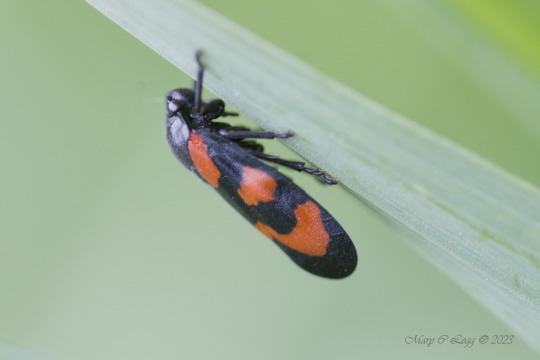
Red and Black Froghopper, Cercopis sanguinolenta Canon 400D EF 100 2.8 f/3.2 1/160 iso: 400 Srbsko, Czech Republic 5/22/2010
#Froghoppers#Spitbugs#spittlebugs#Aphrophoridae#Cercopis#insects#invertebrates#macro#grasslands#pests#insect#macrophotography#insectphotography#canon
0 notes
Text


Staring at plants is so rewarding
1 note
·
View note
Text

@hametsux submitted: São Paulo - Brazil
Huh! Weird fella. Looks like one of the spittlebugs, possibly. I'd need more photos for an accurate ID on this lil friend!
133 notes
·
View notes
Text

Clastoptera xanthocephala is a small spittlebug that feeds on plants in the daisy family. they have false eyes on the ends of their wings!

202 notes
·
View notes
Text



some teeny bugs
#goblincore#nature#goblin aesthetic#critters#bugs#tw bugs#bug friend#bug photography#cool bugs#bug#cute bugs#bugblr#bug boy#bug friends#cottagecore#forestcore#naturecore#nature finds#woods#forest goblin#forest#forest friends#spittlebug#ladybug#planthopper
24 notes
·
View notes
Text

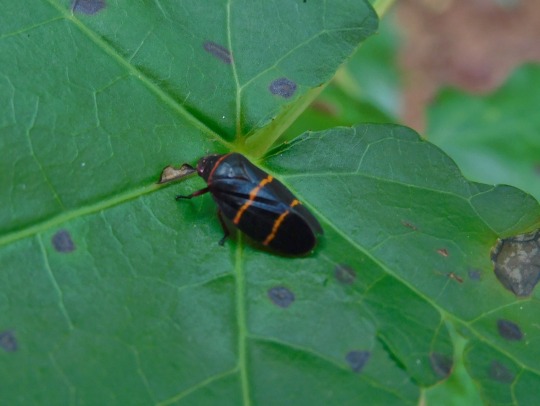

Candy-Striped Leafhopper (Graphocephala coccinea)
Two-Lined Spittlebug (Prosapia bicincta)
13 notes
·
View notes
Text
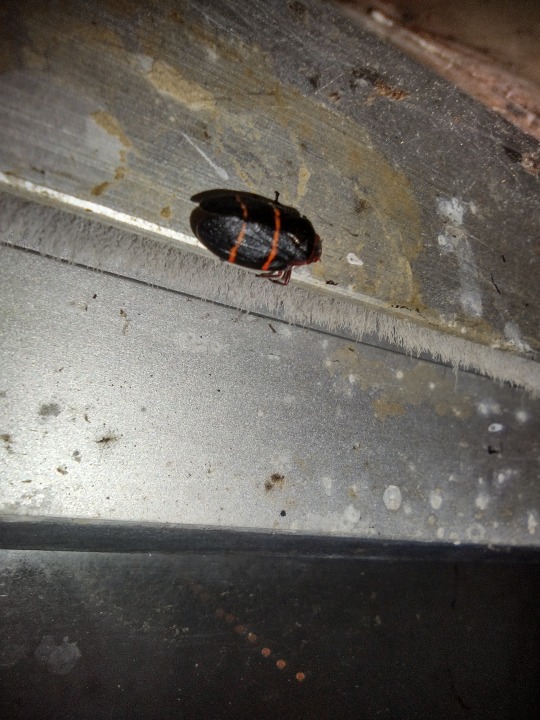
[PHOTO TAKEN: JUNE 9TH, 2024 | Image ID: A photo of a red-striped black froghopper on a metal surface /End ID.]
#Cercopidae#froghopper#spittlebug#true bugs#hemiptera#insects#insect#entomology#bug#bugs#Bugblr#invertebrates#inverts#arthropods#photos#photo#Wasp House Sights
17 notes
·
View notes
Text
I saw. SO MANY BUG today. (Sorry in advance for bad phone camera quality and shaky hands)
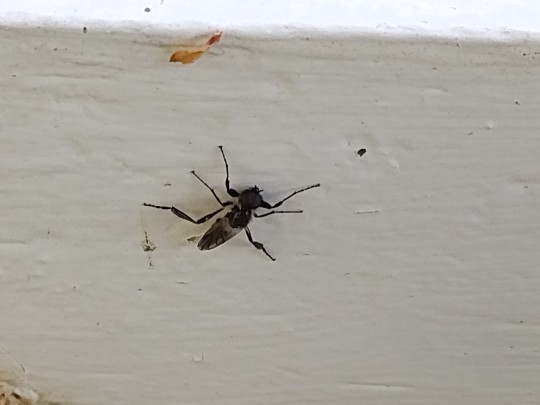
Male March fly!!! (Thanks to @microecobus for the ID!)

Baby sawfly!
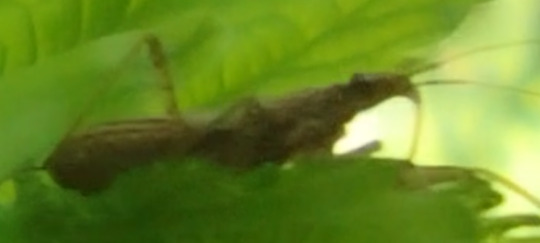
Tiny assassin bug!

Flat bug (actually what they're called) and a zebra jumping spider!

Better look at the jumping spider!

Male California glowworm (species of firefly where only the babies and wingless females glow)!
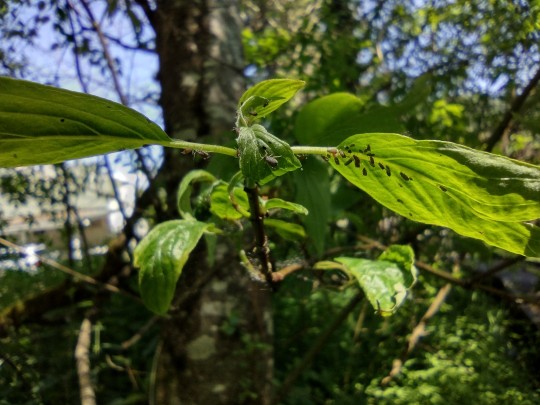
Aphids!

Spittlebug (hiding in the foam on the leaf)!

And last but not least, a huge male snakefly (females have long ovipositors)!!!! So cool to find this one, I've only seen one in person once before in my life!
That's not counting the crane flies, honeybees, ants, little round orange mite, various flies, brown marmorated stink bug (of course), tiger butterfly, boxelder bugs, and tons of little parasitoid wasps I saw pollinating. An excellent bug day for Rev!
#rev retches#insect#bug#assassin bug#aphid#snakefly#firefly#glowworm#spittlebug#fly#spider#jumping spider#true bug#flat bug#beetle#sawfly#larva#my art#photos are art it works#long post
145 notes
·
View notes
Text

Alder Spittlebug
An alder spittlebug clinging to a plant stem in the undergrowth, at Felmersham Gravel Pits.
#alder spittlebug#aphrophora alni#bedfordshire#bug#bugs#canon#canonuk#fauna#felmersham#felmersham gravel pits#insect#insects#invertebrate#invertebrates#minibeast#minibeasts#nature#nature reserve#outdoors#wildlife#wildlife trust#wildlife trusts#wildlifebcn
10 notes
·
View notes
Text






Meadow Spittlebug - Philaenus spumarius
After developing inside a frothy blob of foam while nestled against a thriving plant, an adult Spittlebug emerges, ready to leap and fly! Normally, I find this specie with a tan-brown coloration across their whole body (as can be seen in earlier posts), but today's specimen looks drastically different in terms of color. It could even be mistaken for a different specie, hence it's important to remember that the Meadow Spittlebug's color palette is extremely variable! This individual features a mostly melanistic dorsal side with the rest of its body being a sandy brown color. It's likely decorative, but I order why such patterns arise (i.e. is it phenotypic or diet related) and if there are other benefits to this color variation. Nevertheless, there can be many decorative patterns along the insect's body in all manner of colors, including black, white, brown, grey and a brick-orange (as seen on a comprehensive illustration on Bugguide). However it is still a Meadow Spittlebug. We can see that via the presence of prominent wing veins.
While the veins are visible, I don't see any tiny spots near the tip of its head, but its possible that they aren't there given the melanistic color of this individual. There may be something directly on the face of this Hopper, but alas, my phone wasn't able to focus precisely on the little insect. If you think that's tricky to capture in a picture, try and photograph the spine(s) found on the hind tibia of this Bug. Spittlebugs are distinguished from similar insects in other ways than simply, "the nymphs make and hide in frothy spittle when growing". When they hop in the grass and among plants as they travel, their leaping can often lead to mistaking them for drab Leafhoppers. To be absolutely sure, try (your very best) to locate the prominent spikes - species can have 1 or 2 - along with a ring of spines on the hindlegs. If you find those, you've definitely found a Spittlebug, but good luck trying to observe that in the wild. If they aren't leaping away, Spittlebugs often keep their legs concealed beneath their body; it tends to widen out along the abdomen before converging to a tip (in most species). This gives the jumping legs a bit of coverage while the Bug is at rest or maintaining crypsis against a plant...or perhaps in the shadows for melanistic forms.
Pictures were taken on July 7, 2024 with a Google Pixel 4.
#jonny’s insect catalogue#ontario insect#spittlebug#meadow spittlebug#hemiptera#auchenorrhyncha#true bug#insect#toronto#july2024#2024#nature#entomology#invertebrates#arthropods#photography#animals
2 notes
·
View notes
Text
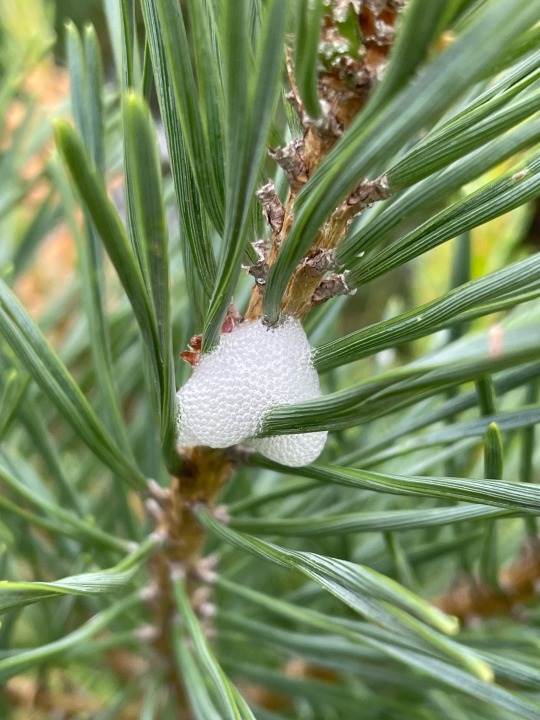
I love froghopper eggs
2 notes
·
View notes